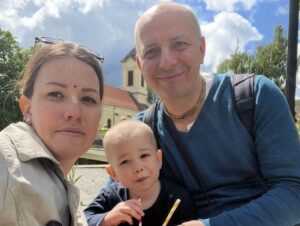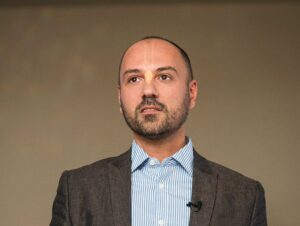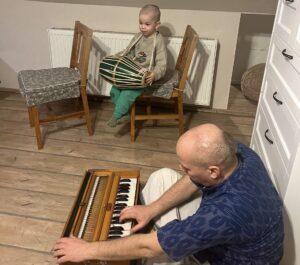Bhakti Song Contest: Using AI and Music for Krishna Conscious Outreach
In Budapest, a grassroots initiative led by Ishvara Krishna Das and Bhakta Szabolcs Tárkányi is exploring one of the most unexpected tools for Krishna-conscious outreach: artificial intelligence. Their project, which blends AI-generated music with a vision for community engagement, aims to spark inspiration among devotees and seekers while highlighting both the promise and the pitfalls of technology in spiritual life.

The Seed of Inspiration
“Although we have reservations about it, we both use artificial intelligence from time to time in our work and services. But we feel that since it exists, and for as long as it exists, we should try to use artificial intelligence in the service of the Supreme Intelligence.”
What began as curiosity quickly turned into a provocative experiment. Together with Szabolcs, a seasoned media and marketing expert who has served ISKCON Hungary for decades, they tested AI music tools to create lyrics and melodies. The results were startling. Within seconds, the software generated orchestrated songs that, though mechanical, carried unexpected emotional resonance.
“It was a very special feeling that this song created by AI created emotions in me. Maybe, I hope, devotional emotions,” recalled Ishvara Krishna. Yet the paradox was clear: how could a machine without a soul produce something for devotional use? “It’s crazy to have a devotional community song written by AI, composed by AI, and presented by AI,” he admitted. “So how can we use it?”
Personal Journeys and Skills
The project reflects not only their shared concern about technology but also their complementary skills. Szabolcs has lived with music since childhood, singing in choirs and playing in bands before finding Krishna consciousness. He has since channeled his professional skills in design and communication into service for ISKCON Hungary. “The beauty of Vaisnava songs, the collective chanting of the mahā-mantra, the bhajans and kīrtans are very appealing to me,” he said.
Ishvara Krishna, meanwhile, has dedicated over two decades to teaching at the Bhaktivedanta College in Budapest. With a background in cultural anthropology and a keen interest in the dialogue between modern science and Vedic wisdom, he is also the author of Nature’s IQ an argument for intelligent design that was translated into English and published internationally. His lifelong interest in music, paired with his academic and preaching background, makes him particularly suited to experiments that blend tradition with innovation.
The Experiment with Music
To test the limits of AI, Ishvara Krishna drafted lyrics infused with themes of devotion, unity, and prayer. He then asked Szabolcs to feed them into a music-generation program. The software produced nearly one hundred variations. Some were moving, some awkward, but a few stood out as surprisingly compelling.
“These programs create the ‘work’ by following instructions. It’s impressive, but also a little scary, that in a few minutes, the AI can create a complete, orchestrated, and almost perfectly mixed version,” said Szabolcs. Yet despite the technological prowess, something was missing: the living consciousness behind devotional sound vibration.
One devotee colleague summed it up: the music was good enough to sell, but it also threatened to diminish the value of human talent. “If you have talent to make music, you are not so valuable today because AI can do it more quickly,” the colleague noted. For Ishvara Krishna, this reinforced the need for real musicians to reclaim and elevate what the AI had merely sketched.
A Community Song Competition
Out of this realization came the idea for a global songwriting competition. “My wife suggested using AI only as inspiration, a provocation even, for devotees who are musicians to create something better,” said Ishvara Krishna.
The competition invites ISKCON musicians worldwide to compose and submit their own community songs, using the AI-generated versions as a starting point or inspiration. The rules encourage entries in English, though traditional Sanskrit or Bengali elements are welcome. The songs will be shared at the end of 2025, with devotees invited to vote online for their favorite.
“A community song helps to strengthen the bonds between ISKCON members, both locally and globally. By explaining the lyrics in detail, the entire philosophy of Krishna consciousness can be presented to those who are interested,” the duo explained in their joint response.
The winning song, and indeed all strong entries, could be performed at Sunday programs, festivals, and outreach events. More importantly, they hope it becomes a bridge for those unfamiliar with traditional kīrtan. “It’s usually not so easily available and understandable for other people who are not devotees, because they cannot connect to mantras, to Sanskrit, to Bengali,” said Ishvara Krishna. “So we suggested using some English lyrics.”
Tradition and Innovation
The pair is quick to stress that their project does not replace the central practice of ISKCON: harināma-saṅkīrtana. “Preserving tradition and adapting to the modern world is an eternal challenge for Vaishnavas and all other world religions,” they affirmed.
“Our temples are oases of traditional bhajans and kīrtans,” they continued. “At the same time, since George Harrison’s service, we have also seen that creative musical adaptations can greatly facilitate the spread of Krishna consciousness teachings and Krishna’s names.”
For them, the “secondary layer” of modern devotional music can expand the reach of ISKCON without compromising its foundation. “If we avoid bad influences, we can create musical works that truly represent the Vaishnava tradition,” they said. The community song project, they hope, will embody that careful balance.
Looking Ahead
While some dream of making the competition an annual event, Ishvara Krishna sees it as tied specifically to ISKCON’s 60th anniversary in 2026. “If the community accepts the winner, and we have a common song expressing our view, then it will be a success,” he said. “It can be an expression of love to Srila Prabhupada, of love to ISKCON, of love to Krishna.”
Yet ultimately, success for them is measured in something simpler. “The main success is if devotees will be inspired to sing more Hare Krishna,” said Ishvara Krishna. “This is first-step outreach. To make a bridge between the non-devotees and devotees. If someone is inspired to chant the mahā-mantra, then it’s useful, then it’s a success.”
For now, they continue refining the contest, inviting entries, and preparing to share the AI-generated prototypes with the international community. It remains, as they call it, “a humble experiment.” But one with the potential to harmonize technology, AI-generated music, and devotion into a song that resonates across the world.
Devotees who wish to participate in the Bhakti Song Contest can now visit the official website, where all the information about the contest is available, entries can be submitted directly through the online form, and the AI-generated songs that served as inspiration can also be listened to here. Inquiries may still be sent via email.



